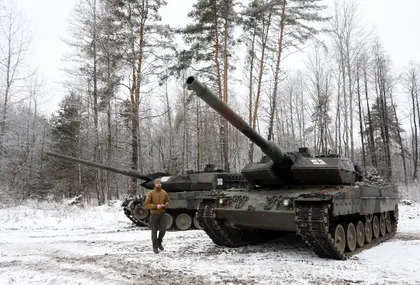Anton Yushyn spent four years studying Italian at university in Kyiv but the outbreak of war taught him the most valuable lesson of his student life: prioritizing what matters most.
When he enrolled at Kyiv National Linguistic University, Russia had not yet invaded, and his main concerns were socializing and passing exams to placate his parents.
JOIN US ON TELEGRAM
Follow our coverage of the war on the @Kyivpost_official.
“Maybe it’s not my goals that have changed but my values,” Yushyn, 22, told AFP on graduation day in Kyiv last month.
“It all used to be about parties and having fun. Now you need to spend more time with family and friends because they could be gone at any moment,” he said.
Thousands of Ukrainians graduating from around 300 universities this summer are entering into a society transformed by war – their futures in doubt with no end in sight to the fighting.
As Ukraine mobilizes young men to replenish the army’s stretched ranks, male graduates face the prospect of being called up once they turn 25.
Higher education has not been immune from the conflict.
Dozens of teachers and professors have been fighting on the front lines and one-fifth of the sector’s facilities have been damaged or destroyed by Russian bombardments.
In December 2022, a missile landed just a few hundred meters from Yushyn’s campus.
To stay, or leave
But on graduation day, the mood at Yushyn’s alma mater was festive.

Russian Air Attack Kills Nine in Sumy Region
Perfume hung in the hot summer air and staff congratulated joyful students for completing their studies in the face of historic turbulence.
Student life was barely back to normal after the Covid pandemic when Russia invaded in February 2022.
Universities suspended classes and Korean language student Nikoletta Shova was sent by her parents to stay with relatives in Italy.
The 22-year-old compared the “emotional” time abroad to being in a “stupor,” left wondering if she would ever be able to return.

Teaching restarted at most universities just a few weeks later – online or in person – when Russian forces were still on Kyiv’s outskirts.
Shova returned after three months away and was able to finish her degree in person while raising money for the war effort with classmates.
Now, with her diploma in hand, uncertainty had returned.
She was considering studying abroad – possibly marketing in the United States – but she was also open to finding a creative job at home.
Building a future in Ukraine despite the war was possible, she said, borrowing a popular phrase to underscore that it would take perseverance: “he who doesn’t take risks never drinks champagne.”
Jokes, memes
“So I’m being realistic but with a bit of positivity,” she said of her future.
Daryna Dekhtiar, 22, also a graduate of Kyiv National Linguistic University, went numb when Russia invaded.

“I didn’t cry at all. I just went into autopilot,” she said, but her friends had helped lift her spirits too, she added.
“We created our own memes, our jokes, it made it all much easier,” she recalled.
Dana Andriichuk, who already had secured an office job by graduation, was rushing to meet friends after the ceremony.
She didn’t want to dwell on the relative comfort of her student years or spend too much thinking about the prospect of a long war.

“I’m trying to avoid being a pessimist stuck in the past. I want to live now and not in the future, because we don’t know what will happen next,” she said.
“If the government encourages young people to stay and do everything possible to build a better future even in a state of war – and society becomes nationally conscious – then we can consider staying in the country,” she said.
“Don’t run and hide”
Like thousands of other male graduates, Yushyn does not have as much freedom to choose. Authorities have barred men aged between 18 and 60 from leaving Ukraine.
Thousands have left illegally and dozens have died trying.
But Yushyn was resigned to life at home.
“Real men don’t run and hide. If the time comes and I get a summons, I won’t run from it,” he told AFP.
“I can wind myself up, cry, sit here trembling all I want, it won’t change the trajectory of the rocket,” he said.
Whatever the future holds, he said he was unlikely to use Italian, but was resolved to spending his time as best he could.
“I need to use it to the fullest.”
You can also highlight the text and press Ctrl + Enter










